Life
He was born on 27 June 1776. [1] On his own account, he went into banking in 1801. He became a partner in the private bank Spooner, Attwood & Co. of Gracechurch Street, London, around 1816. [2] [3] [4]
Twells was the initial deputy chairman of the London & Greenwich Railway in 1834, resigning in 1837. [5] He gave evidence to the 1857 Parliamentary Select Committee on the working of the Bank Charter Act 1844. [6] He approved of the Bank Restriction Act 1797. [4] On early colonial scrip, Twells commented that
"In a bad hour, the British Parliament took away from America its representative money [...]" [7]
Karl Marx picked up on his comment that the 1844 Act had been profitable for bankers, while disadvantaging merchants and those in business in a small way. [8]
Twells died on 10 March 1866. [1] How can paper money increase the wealth of a nation? (1867, anonymous) [9] was by his son John. [10]
Family and connections
Twells married Mary Line, daughter of Joseph Line of Alum Rock, Worcestershire, and they had two sons, the Rev. John Twells and Philip Twells M.P. [1] [11] Matthias Attwood M.P. was a connection in the London & Greenwich, where he was treasurer, and in the bank. [3] He was also a connection by marriage, having married Susanna Twells, daughter of Twells's brother William. [12]
Twells & Co., the Birmingham manufacturers, proprietor Philip M. Twells, were related. They supplied a locomotive to the London & Greenwich, No. 8 Thames, in 1838, thought to be a one-off. [13] It has been suggested that they acted only as agents. [14] Philip Mellor Twells was a Birmingham brass and copper tube manufacturer. [15] Edward Twells was son of Philip Mellor Twells of Ashted. [16]
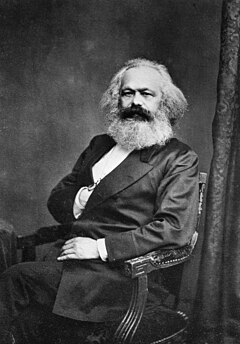
Karl Heinrich Marx was a German philosopher, economist, historian, sociologist, political theorist, journalist and socialist revolutionary. Born in Trier, Germany, Marx studied law and philosophy at university. He married Jenny von Westphalen in 1843. Due to his political publications, Marx became stateless and lived in exile with his wife and children in London for decades, where he continued to develop his thought in collaboration with German thinker Friedrich Engels and publish his writings, researching in the reading room of the British Museum. His best-known titles are the 1848 pamphlet The Communist Manifesto and the three-volume Das Kapital (1867–1883). Marx's political and philosophical thought had enormous influence on subsequent intellectual, economic and political history. His name has been used as an adjective, a noun, and a school of social theory.

London Bridge is a central London railway terminus and connected London Underground station in Southwark, south-east London. It occupies a large area on three levels immediately south-east of London Bridge, from which it takes its name. The main line station is the oldest railway station in London fare zone 1 and one of the oldest in the world having opened in 1836. It is one of two main line termini in London to the south of the River Thames and is the fourth-busiest station in London, handling over 50 million customers a year.

Lewisham is a National Rail and Docklands Light Railway station in Lewisham, south-east London which first opened in 1849. On the National Rail network it is 7 miles 61 chains (12.5 km) measured from London Victoria and is operated by Southeastern.
The London and Croydon Railway (L&CR) was an early railway in England. It opened in 1839 and in February 1846 merged with other railways to form the London Brighton and South Coast Railway (LB&SCR).
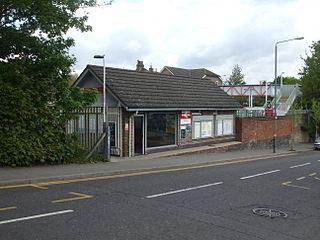
Anerley railway station is in the London Borough of Bromley in south London. The station is operated by London Overground, with Overground and Southern trains serving the station. It is 7 miles 47 chains (12.21 km) down the line from London Bridge, in Travelcard Zone 4.

Norbury railway station is in the London Borough of Croydon in south London, 7 miles 36 chains (12.0 km) down the line from London Victoria. The station is operated by Southern, which also provides the majority of services and is in Travelcard Zone 3. Ticket barriers are in operation at this station.

The London and Greenwich Railway (L&GR) was opened in London between 1836 and 1838. It was the first steam railway in the capital, the first to be built specifically for passengers, and the first entirely elevated railway.
Events from the year 1836 in the United Kingdom.
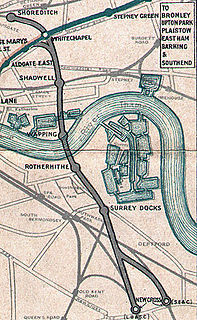
Southwark Park was a railway station in Bermondsey, south-east London, on the Greenwich Line between Spa Road and Deptford. It was opened by the South Eastern and Chatham Railway on 1 October 1902, on approximately the same site as the then long-closed Commercial Dock railway station. It was close to the southern end of Southwark Park, from which it took its name. South Bermondsey railway station, on the South London Line, is nearby.
The Brighton, Lewes and Hastings Railway was an early railway in southern England that built the East Coastway line running between the three East Sussex towns mentioned in its name. The company existed from February 1844 but only operated trains for a few weeks during June and July 1846 before it was amalgamated with other companies to form the London Brighton and South Coast Railway (LB&SCR) on 27 July 1846.
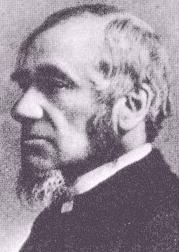
Rev. Canon Henry Twells (1823–1900) was an Anglican clergyman, hymn writer and poet. His best known hymn was "At Even, Ere the Sun Was Set". He also wrote the well-known poem, "Time's Paces" that depicts the apparent speeding up of time as we become older. A younger brother, Edward Twells, was the first Bishop of Bloemfontein.
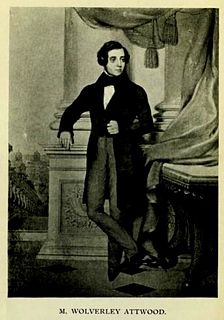
Matthias Wolverley Attwood was a British businessman and Conservative Party politician.

Philip Twells was a Conservative Party politician.

Abel Rous Dottin was a British army officer and politician, Member of Parliament for Gatton and Southampton.
George Walter (1790–1854) was an English entrepreneur, known for his involvement with early railways of the 1830s.

Sir Richard Digby Neave, 3rd Baronet (1793–1868), usually known as Digby Neave, was an English artist and author.
Robert Johnston (1783–1839) was a plantation owner in Jamaica and an investor in the London & Greenwich Railway.
Matthias Attwood was a British Conservative and Tory politician, and banker.
The Boston, Sleaford and Midland Counties Railway opened a railway line between Grantham and Boston, through Sleaford, England. It opened in two stages, in 1857 and 1859.
This page is based on this
Wikipedia article Text is available under the
CC BY-SA 4.0 license; additional terms may apply.
Images, videos and audio are available under their respective licenses.











